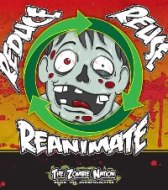Multiple people have suggested that I just stay out of the whole Puppies mess because it will only upset me, and besides, “What’s the point?” I have answered that in part in one place or another, but thought I should address it as a whole at some time, and Eric Flint’s essay, In Defense of The Sad Puppies made that time now.
Eric is one of the sharper and wiser voices in the whole Puppy Mess, plus he’s a damn fine person to sit and talk to while nursing a white wine at Nebula Awards Weekend. But in this case, he got a couple things wrong. Only one thing concerns me here, which is, “What is the Point?” Eric, like others nearer to the angels than I am, want to solve the situation by calm, reasoned discussion. I have heard similar sentiments from a number of people I respect in the field. Or to use Eric words:
partly in the hope that I can persuade the Sad Puppies to change their minds…
…
The debate/argument/brawl…that we are now having over the Hugo Awards is one that I would like to end. I’ve been mostly arguing against the Sad Puppies not out of animosity…but because I am trying to persuade them that their analysis of the situation is faulty and the course of action they’ve adopted is futile at best.
A noble sentiment. Here’s the problem: It won’t work. At all. Zilch. Reason, thought, philosophical arguments—none of those will help. There will be no calm, well considered ending to this. There will be no persuasion—or so little as to be within any margin of error. It won’t be ended by persuading the Pups to change their mind, or to reevaluate their course of action. Nor will reason change the anti-pup’s minds. I’m not saying it won’t end, or that people may not end up changing their minds, but not this way.
People don’t work that way.
OK, I suppose I need to back that up. Luckily, I was married to a girl trained in psychology for 26 years (with her for 26 years, not that she was training for 26 years). Two factors are in play: Motivated Reasoning and Backfire. Both are related to cognitive dissonance. “Cognitive dissonance is the mental stress or discomfort experienced by an individual who holds two or more contradictory beliefs, ideas, or values at the same time, or is confronted by new information that conflicts with existing beliefs, ideas, or values” (Festinger, L. (1957). A Theory of Cognitive Dissonance—Thank you Wikepedia). In other words, people don’t like it when their beliefs are contradicted, so their minds will do whatever they can to relieve the stress. Not find truth, but relieve the stress.
When we (humans—not Puppies or SJWs or conservatives or liberals, but humans) become emotionally involved in a belief, we cling to that belief, inventing ways, often convoluted, to keep it in the face of all evidence. We do not look at contrary evidence, rationally consider it, and then come to the best conclusion. We only do those things, to the extent that we do them at all, when forming new beliefs and with ones that hold no emotional importance. If we are emotionally involved (like in the Puppy Mess), we use motivated reasoning.
This model envisions respondents as processing and responding to information defensively, accepting and seeking out confirming information, while ignoring, discrediting the source of, or arguing against the substance of contrary information. (DiMaggio 1997; Kunda 1990; Lodge and Tabor 2000—Thank you Google).
So, if you try to persuade a Pup that he isn’t oppressed, that slate voting isn’t swell, etc., etc. he will ignore any facts you might have (like listing conservative writers who’ve been nominated for awards) or discount those facts because they come from the wrong people. Yes, it is a matter of the Pups being dense, but dense in the way humans are. We’re all wired this way.
Ah, but it gets worse. Backfire.
We’d like to believe that most of what we know is accurate and that if presented with facts to prove we’re wrong, we would sheepishly accept the truth and change our views accordingly.
A new body of research out of the University of Michigan suggests that’s not what happens, that we base our opinions on beliefs and when presented with contradictory facts, we adhere to our original belief even more strongly. (In Politics, Sometimes The Facts Don’t Matter, NPR July, 2010).
You can find the study yourself—it was all over the Internet. (If you want details, this is a nice overview)
So, not only do humans disregard logical arguments and facts contrary to their position, hearing those make them hold their belief stronger. And we’ve seen this. I’ve been told by others that know Brad Torgersen better than I, that he wrote mainly about exciting, old-timey, science fiction adventure being left out in favor of message fiction when he started his role of Pup in Chief. But as his facts were called into question, as his views were challenged, he slipped more and more into Larry-speak, and even Vox-speak, of oppression and secret cadres of leftists and vague but great evils that oppose him and those of good nature. And he upped his insults, such that it is very hard to find anything from him now that doesn’t include simple name-calling.
I could go into more on why and how people do not change their views when confronted with facts and reason. Eugie used to talk about areas of psychology dealing with how people take emotional views and make them part of their identity, and then cannot give up those views without losing their sense of self. Separately, I noticed in graduate school, where I trained in logic, that almost no one would accept a logical argument that contradicted their non-logically held beliefs. But, I don’t need any more. Motivated reasoning and backfire will do just fine.
Now the Pups are dug in deep. It matters to them. There is anger, and a sense of community. And those who oppose the Pups equally Believe, with a capital “B.” No one is changing anyone’s mind.
I am not saying no one ever changes their mind. Obviously people do, but for emotional issues, it takes emotional events. Traumas, both bad and good (yes, I just said you can have good trauma—live with it) can do it. Life changing events. It works even better if the event is related to the belief, even if the connection is tenuous, but it isn’t necessary. If a person finds their life altered, their identity changed, there is less need to clutch at old held beliefs. So, if something horrible happened in Larry Correia’s private life, he might change his views (I had a good example, but decided specifying terrible things that could happen to Pups was not the best way to go). Or perhaps Vox Day might fall in love. Find his dream girl. Better yet, find his dream girl in a Hugo winning WOC, one who isn’t repulsed by the new Vox. Then we might see a Vox who rejects his Pups, and his blog, and his life up to this point. The same is true for anti-pups. The death of my wife has effected my views, but only in that I see most problems in the world as nothing but minor inconveniences—so no switch in kind, just in degree. A major trauma to some other anti-pup might make that person reevaluate his anti-pupdom.
But none of that does us any good. We can’t count on anyone going through a major life change.
So, what’s the point? Why all the words from so many people? If it isn’t to change the minds of those who hold positions—or shouldn’t be since that can’t work—what is it?
Partly, it is to bring new people, those who have yet to develop an emotional attachment, to one side. The more Pups, the more they can feel like they are winning. And the same goes for us anti-pups. Actually winning is another matter. And partly it is to whip up the troops and to keep that sense of community that humans crave. The second is important because, while the entrenched will not switch sides, they may lose enthusiasm. Some other movement may come along which is more important or simply newer. A string of police shootings of blacks could sap some of the anti-pups (hmmm, except that hasn’t happened). A politician suggesting more thorough gun registration could pull off some Pups. People get tired.
So, how does this end? Not with Eric persuading or David Gerrold’s call for respect. Not with valentines saying “All is forgiven” and kumbayas. We, humans, are creatures of grudges. We should try to be better beings, but never forget reality while doing so. Those who forget history…
There will be no ending, no defined finish. But there can be, and almost certainly will be, a fading. There will be fewer articles, fewer rants, fewer votes cast for political reasons. It can gently drift away until it is a footnote. Or it can lessen, but still split fandom for years to come. How this works out depends on how it fades. If enthusiasm dies quicker from the anti-pups, the results will be less equality than in recent years, a continuation of the dominance of white authors, a touch less innovation in known writers, a reduction in the quality of writing, and a greater acceptance of minor racism and sexism in fandom, (keeping in mind those grand statements only apply to awards and to a corner of fantasy and science fiction fandom—the Pups are not going to be altering racism in general society—so how big a deal this is to you depends on how close you are to that corner). If it dies quicker in the Pups, things will float closer to how they were: increasing equality, a lessening of dominance of white authors, more innovation, and greater condemnation of racism and sexism (still just in our pocket of fandom—again, don’t get too excited by those lofty phrases). Either way, the effects will not be that large, except for The Hugos, where the awards will lose some of their prestige if the Pups end up more on top, and slowly gain most of it back if the Pups end up on bottom.
Of course things could get worse. New Pup leaders could arise who have the charm of Vox and the mouth of Larry. We could start getting death threats and rape threats.
I expect a very slow fade, with people snapping at each other for a few years at least, and grumbling when alone with their colleagues for many years. I hope the Pups will fade faster, but as it will be most likely determined by general fatigue, there’s no way to know. One “side” could fade faster (keeping in mind there really is only one side to this mess—the Pups are the side; everybody else are just fans who got stuck in a fight they didn’t ask for) if its leaders faded. If Vox or Brad or Larry were to go through some life change, or just get caught up in other matters, the Pups would fade faster and we’d have less Puppy smell. There are no leaders in the fans who dislike the pups, but some, like John Scalzi, David Gerrold, and George R.R. Martin might have more of an effect if they walked away in disgust.
So, what’s my point? Why do I write all these words over so many posts? Partly it is an obsession to support what I think is right, even when it will make very little difference. Partly it is because I know how she felt about the Pups, and would feel about their mess, though she’d have said a great deal less about it. Partly it is to help out friends. Partly it is to whip up the troops as I’d prefer less Puppy smell. Partly it is to be part of the community. But mainly, for me, it is a distraction. Because this was Eugie’s world, it feels a little important, and because it is not what I spent my time doing before, it doesn’t feel lonely, which makes it a good distraction. And that is the point.
 So, after all the screaming and shouting and threats and pain–I mean on Facebook and blogs, not in Westeros–I finally got around to Season 5 of Game of Thrones and it was…Not Bad. It was a little slow, a bit dull in spots, but had a pretty good final two episodes, so I give it a “not bad.”
So, after all the screaming and shouting and threats and pain–I mean on Facebook and blogs, not in Westeros–I finally got around to Season 5 of Game of Thrones and it was…Not Bad. It was a little slow, a bit dull in spots, but had a pretty good final two episodes, so I give it a “not bad.”
 6. The Zombie Nation Book #2: Reduce Reuse Reanimate
6. The Zombie Nation Book #2: Reduce Reuse Reanimate Of course the big event was the Nebula Awards. The banquet room was noisy so I could only speak with those right next to me, but since Jack McDevitt was next to me, that was all good. The food was…OK. Banquet food is never great. The ceremony was a big change from the last one I’d been to, since the emcee was Nick Offerman doing comedy. The winners were gracious and by now you probably know Eugie didn’t win, though I don’t think I could have gone up if she had. I’m afraid I made a rather public spectacle of myself during the In memoriam section early in the ceremony. When Eugie’s name and picture (that picture) came up on screen I fell apart. Well, it’s not a party till someone cries.
Of course the big event was the Nebula Awards. The banquet room was noisy so I could only speak with those right next to me, but since Jack McDevitt was next to me, that was all good. The food was…OK. Banquet food is never great. The ceremony was a big change from the last one I’d been to, since the emcee was Nick Offerman doing comedy. The winners were gracious and by now you probably know Eugie didn’t win, though I don’t think I could have gone up if she had. I’m afraid I made a rather public spectacle of myself during the In memoriam section early in the ceremony. When Eugie’s name and picture (that picture) came up on screen I fell apart. Well, it’s not a party till someone cries.